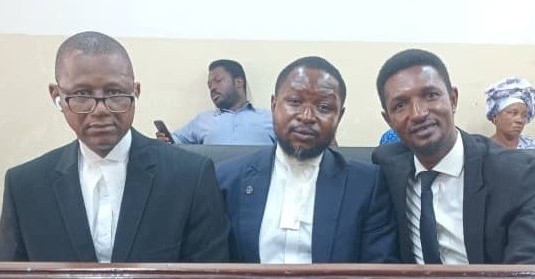The Court of Appeal of Sierra Leone today delivered a significant judgment in the matter of Aiah Fengai & 73 Others v. Octea Limited & Others, overturning a prior High Court decision that had struck out the plaintiffs’ claims for lack of jurisdiction.
In a unanimous ruling delivered by a three-member panel of Justices of the Court of Appeal presided over by Justice Fynn, the Court found that the High Court had erred in law when it ruled that the plaintiffs lacked the legal standing (locus standi) to bring the case and granted an interlocutory injunction freezing the companies’ assets. The case will now return to the High Court for trial.
Background
The case involves 74 plaintiffs, all residents of Kono District, who had initially filed multiple writs of summons against Octea Limited and other associated parties, alleging a wide range of environmental, economic, and personal harms arising from the defendants’ mining operations. These claims included allegations of unlawful deprivation of property, environmental degradation, economic displacement, and emotional distress. The writs were consolidated into one action at the High Court.
However, on 27th October 2022, the High Court struck out the consolidated action, holding that it lacked jurisdiction to hear the matter on the basis that the plaintiffs had no legal capacity to sue, and were not privy to any contract that would entitle them to claim under the relevant mining and environmental laws.
Appeal and Findings
Dissatisfied with that decision, the plaintiffs, represented by C and J Partners, with Dr. Chernor M. Benedict Jalloh as the Lead Counsel, sought and were granted leave to appeal to the Court of Appeal. The appeal was based on several key errors in the High Court’s decision, notably:
- Failure to recognize that many of the plaintiffs’ claims arose from personal damages (rather than contractual claims) for which legal standing could not be denied.
- Failure to recognize that plaintiffs had property rights that were protected under law, even if the ownership of their land was vested in traditional Chiefs.
- The need to extend Sierra Leone law to recognize universal standing to enforce environmental rights and obligations.
- Unwarranted imposition on the plaintiffs of an obligation to use an internal corporate grievance mechanism before coming to court, despite recognition that the grievance mechanism was not actually functional.
After careful consideration of all the submissions, the Court of Appeal issued a judgment that resoundingly vindicates the plaintiffs’ rights to justice for the harm they suffered. Quoting the famous maxim that: “where there’s a wrong there must be a remedy,” the Court criticized the trial judge for striking out all the plaintiffs’ claims and held that damages for personal injury, property deprivation, emotional harm, and nuisance (environmental harms that affect residents’ peaceful enjoyment of their property) could go forward.
Breaking new legal ground, the Court of Appeal also concluded that the plaintiffs had the right to sue for violations of the rights they hold to the traditional lands they inhabit, even if those lands belong to the Chiefs by law. Noting that giving Chiefs the exclusive right to account for the land their subjects occupy “does not sit easily on our mind,” and giving credit to the courts of Ghana for recognizing the same principle, the Court decided that residents of customary lands should be able to sue for infringements on that land when their Chiefs decline to do so. “Monarchs are now seldom found to be absolute, and their conduct comes under scrutiny regularly the World over. It is our opinion that the attempts to make the right to sue or be sued with respect to customary land exclusive to the chiefs have lost its allure … We opine that to hold anything to the contrary would be absurd.”
The Court also criticized the trial court for accepting unsubstantiated arguments that agreements between the Chiefs and the company had deprived the plaintiffs of their right to sue, and for requiring the plaintiffs to use Octea’s corporate grievance mechanism without giving them the chance to prove that the mechanism was inoperative.
Finally, the Court granted an interlocutory injunction, extending the interim freezing order that it had imposed on the companies’ assets until a final judgment in the case is reached. The Court recognized that this measure was necessary to prevent the company from stripping its assets from Sierra Leone in advance of the trial.
Implications
This decision paves the way for the plaintiffs to return to the High Court and have their claims fully heard on their merits. It marks a significant development in access to justice for affected communities in resource-rich regions and expands the scope of legal standing for land rights claims on customary lands in Sierra Leone.

Recent Comments